Our Research
At BIFCap Nepal, our research endeavors are dedicated to developing and implementing financial education programs that serve communities and enhance human capacity globally. By focusing on various sectors, including organizations, multinational corporations (MNCs), banking and financial institutions (BFIs), and marginalized societies, we aim to foster financial literacy, economic empowerment, and sustainable growth.

Programs and Research Areas
1. Organizations and MNCs
- Objectives:
- To provide tailored financial education programs that address the specific needs of organizations and MNCs.
- To enhance the financial decision-making capabilities of employees and management.
- To promote sustainable financial practices within organizations.
- Programs:
- Corporate Financial Training: Workshops and seminars on financial management, budgeting, and investment strategies for corporate employees.
- Executive Leadership Programs: Advanced financial training for senior management and executives.
- Impact:
- Improved financial literacy among employees leads to better financial health and productivity.
- Enhanced financial decision-making at the executive level promotes sustainable business practices.
2. Banking and Financial Institutions (BFIs)
- Objectives:
- To strengthen the financial capabilities of BFIs' employees.
- To improve customer service through enhanced financial knowledge.
- To foster a culture of financial responsibility and ethical practices.
- Programs:
- Banking Sector Training: Comprehensive training programs on credit analysis, loan assessment, and risk management for bank employees.
- Customer Service Excellence: Workshops focused on improving the financial advisory skills of frontline staff.
- Impact:
- Enhanced skills and knowledge among BFI employees result in better service delivery and financial product innovation.
- Increased trust and satisfaction among customers due to improved financial advisory services.
3. Communities and Development Organizations
- Objectives:
- To promote financial inclusion and literacy among community members.
- To empower communities with the knowledge to manage their finances effectively.
- To support development organizations in their financial education initiatives.
- Programs:
- Community Outreach Programs: Financial literacy workshops tailored for local communities, covering topics such as savings, budgeting, and credit management.
- Partnership Programs: Collaborations with development organizations to implement large-scale financial education initiatives.
- Impact:
- Increased financial literacy leads to greater economic stability and empowerment within communities.
- Successful partnerships with development organizations amplify the reach and impact of financial education programs.
4. Students
- Objectives:
- To introduce financial literacy at an early age.
- To prepare students for future financial responsibilities.
- To foster a culture of saving and financial planning.
- Programs:
- School and University Programs: Interactive sessions on saving, budgeting, investment, and financial planning.
- Financial Literacy Camps: Hands-on workshops and activities designed to teach students about personal finance.
- Impact:
- Students develop a strong foundation in financial literacy, leading to informed financial decisions in adulthood.
- Increased awareness and engagement in financial planning from a young age.
5. Women Entrepreneurs
- Objectives:
- To empower women with the financial knowledge necessary to start and run successful businesses.
- To enhance access to financial products and services tailored for women entrepreneurs.
- To promote economic independence and entrepreneurship among women.
- Programs:
- Business Finance Workshops: Training on budgeting, accounting, and financial planning for women-led businesses.
- Access to Finance Seminars: Information sessions on microfinance, loans, and grants available to women entrepreneurs.
- Impact:
- Women entrepreneurs gain confidence and skills in managing their business finances.
- Increased access to financial resources leads to business growth and sustainability.
6. Salaried Workers
- Objectives:
- To educate salaried workers on effective financial management.
- To enhance understanding of savings, investments, and retirement planning.
- To promote financial well-being and security.
- Programs:
- Personal Finance Workshops: Sessions on budgeting, managing expenses, and saving strategies.
- Retirement Planning Seminars: Guidance on pension plans, investments, and long-term financial security.
- Impact:
- Salaried workers improve their financial health and security.
- Increased participation in savings and investment plans.
7. Marginalized Societies
- Objectives:
- To promote financial inclusion among marginalized and underserved communities.
- To provide basic financial education and access to financial services.
- To empower these communities economically.
- Programs:
- Community Financial Literacy Programs: Basic financial literacy sessions on savings, credit, and budgeting.
- NGO Collaborations: Partnering with local NGOs to reach remote areas and provide financial education.
- Impact:
- Greater financial inclusion and access to banking services.
- Enhanced economic opportunities and financial stability for marginalized communities.